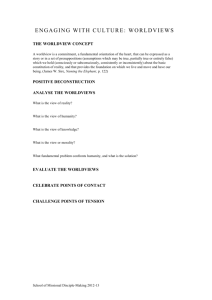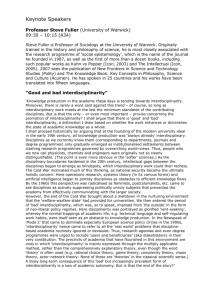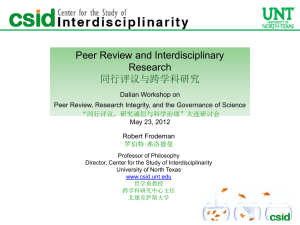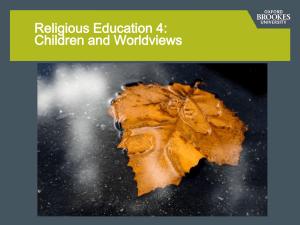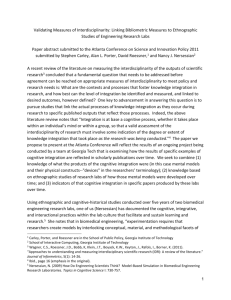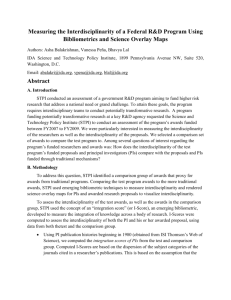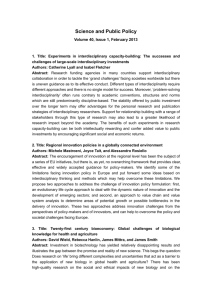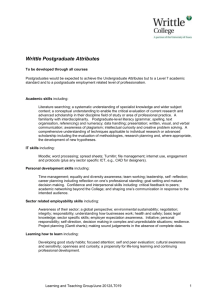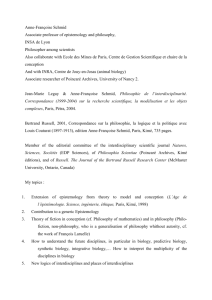The Construction of Worldviews and the Dissemination of Scientific
advertisement
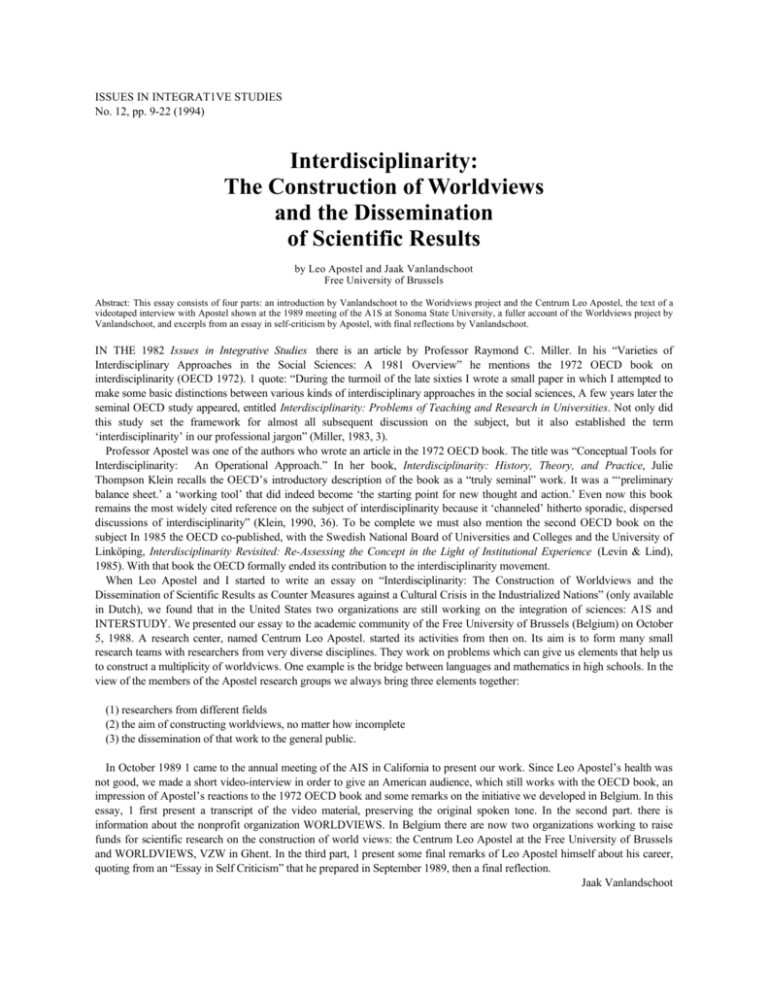
ISSUES IN INTEGRAT1VE STUDIES No. 12, pp. 9-22 (1994) Interdisciplinarity: The Construction of Worldviews and the Dissemination of Scientific Results by Leo Apostel and Jaak Vanlandschoot Free University of Brussels Abstract: This essay consists of four parts: an introduction by Vanlandschoot to the Woridviews project and the Centrum Leo Apostel, the text of a videotaped interview with Apostel shown at the 1989 meeting of the A1S at Sonoma State University, a fuller account of the Worldviews project by Vanlandschoot, and excerpls from an essay in self-criticism by Apostel, with final reflections by Vanlandschoot. IN THE 1982 Issues in Integrative Studies there is an article by Professor Raymond C. Miller. In his “Varieties of Interdisciplinary Approaches in the Social Sciences: A 1981 Overview” he mentions the 1972 OECD book on interdisciplinarity (OECD 1972). 1 quote: “During the turmoil of the late sixties I wrote a small paper in which I attempted to make some basic distinctions between various kinds of interdisciplinary approaches in the social sciences, A few years later the seminal OECD study appeared, entitled Interdisciplinarity: Problems of Teaching and Research in Universities. Not only did this study set the framework for almost all subsequent discussion on the subject, but it also established the term ‘interdisciplinarity’ in our professional jargon” (Miller, 1983, 3). Professor Apostel was one of the authors who wrote an article in the 1972 OECD book. The title was “Conceptual Tools for Interdisciplinarity: An Operational Approach.” In her book, Interdisciplinarity: History, Theory, and Practice, Julie Thompson Klein recalls the OECD’s introductory description of the book as a “truly seminal” work. It was a “‘preliminary balance sheet.’ a ‘working tool’ that did indeed become ‘the starting point for new thought and action.’ Even now this book remains the most widely cited reference on the subject of interdisciplinarity because it ‘channeled’ hitherto sporadic, dispersed discussions of interdisciplinarity” (Klein, 1990, 36). To be complete we must also mention the second OECD book on the subject In 1985 the OECD co-published, with the Swedish National Board of Universities and Colleges and the University of Linköping, Interdisciplinarity Revisited: Re-Assessing the Concept in the Light of Institutional Experience (Levin & Lind), 1985). With that book the OECD formally ended its contribution to the interdisciplinarity movement. When Leo Apostel and I started to write an essay on “Interdisciplinarity: The Construction of Worldviews and the Dissemination of Scientific Results as Counter Measures against a Cultural Crisis in the Industrialized Nations” (only available in Dutch), we found that in the United States two organizations are still working on the integration of sciences: A1S and INTERSTUDY. We presented our essay to the academic community of the Free University of Brussels (Belgium) on October 5, 1988. A research center, named Centrum Leo Apostel. started its activities from then on. Its aim is to form many small research teams with researchers from very diverse disciplines. They work on problems which can give us elements that help us to construct a multiplicity of worldvicws. One example is the bridge between languages and mathematics in high schools. In the view of the members of the Apostel research groups we always bring three elements together: (1) researchers from different fields (2) the aim of constructing worldviews, no matter how incomplete (3) the dissemination of that work to the general public. In October 1989 1 came to the annual meeting of the AIS in California to present our work. Since Leo Apostel’s health was not good, we made a short video-interview in order to give an American audience, which still works with the OECD book, an impression of Apostel’s reactions to the 1972 OECD book and some remarks on the initiative we developed in Belgium. In this essay, 1 first present a transcript of the video material, preserving the original spoken tone. In the second part. there is information about the nonprofit organization WORLDVIEWS. In Belgium there are now two organizations working to raise funds for scientific research on the construction of world views: the Centrum Leo Apostel at the Free University of Brussels and WORLDVIEWS, VZW in Ghent. In the third part, 1 present some final remarks of Leo Apostel himself about his career, quoting from an “Essay in Self Criticism” that he prepared in September 1989, then a final reflection. Jaak Vanlandschoot PART I Interview with Leo Apostel JV indicates question from Jaak Vanlandschoot LA indicates answer from Leo Apostel JV: What’s your view of the 1972 OECD book about interdisciplinarity? LA: The book was prepared by a large and heterogeneous group of people. Its content reflects this diversity of origins. There is no real unity of style and/or method in the book. In a way this is an advantage: the reader is certainly able to compare very divergent views of interdisciplinarity. But it’s also a difficulty because s/he will easily confuse certain views with each other. Obviously the book has been perceived mainly as expressing Lichnerowicz’s views on interdisciplinarity (that we can summarize as follows: the real interdisciplinarity is the mathematization of all sciences). Another popular insight that the book presents was Piaget’s view (the real interdisciplinarity is the psycho-genetic study of the divergent ways of thinking which are present in the different sciences). A third important point of view was that of Jantsch (in a strongly hierarchized society a kind of hierarchical system did surround scientific endeavor and real interdisciplinarity was the pursuit of research in service of this overarching hierarchical social purpose). All three of these influential authors made use of algebraical, mathematical, cybernetical system theoretical languages and concepts. The book has been perceived by many as a kind of imperialistic move by systems theory in a cybernetic sense in the interdisciplinary field. I personally liked the atmosphere of the Nice conference very much. It was a time of strong enthusiasm. There was a strong battle between the American and Continental factions. The Continental factions (still remembering 1968 very much) wanted a kind of interdisciplinary research that had a strong social, ideological and personal significance. The American-Anglo Saxon faction was more pragmatically inclined. I remember very vividly the opposition between the Americans and the Continentals, among which 1 considered myself to be a not very “normal” representative. Now you see the multiplicity of the 1972 OECD conference. The multiplicity of the book was, to a certain extent, not completely seen by its readership. When 1 think about my own contribution to the book, it was certainly not meant to be a repetition or strengthening of the views put forward by Lichnerowicz, Piaget and Jantsch. The solutions to interdisciplinarity they suggested seemed to me only partial solutions. I stated that, but it seems to me that the readership hasn’t noticed my point concerning those three influential authors. My aim was the following one: I wanted to see scientific groups as social entities, performing given actions, characterized by specific interactions among the members, using different languages in order to communicate and reproducing themselves by means of learning-strategies or renewal-strategies. Sciences were for me very concrete and living entities. Now the intersciences (the construction of fields that would bring into interaction many sciences} had to be seen as the genesis of living social entities. 1 used in my paper a few formulas in order to describe these social entities, but the main problem was: can we defend the usefulness of the difficult creation of these new social entities (the inter-sciences)? How can you defend in a nonideological and non-political way the creation of new social entities? According to me at the end of World War II we saw the birth of a new science of organization-theory, of operational research. If I wanted to defend a new organizational principle for scientific research I had to look at the contribution of operations research, or organization-theory, and 1 had to defend my proposal for a new way of living in science by means of these arguments. It wasn’t my point to stress that operational research was by itself interdisciplinary research. Operational research was for me only a kind of atmosphere in which 1 saw a rational argument in favor of interdisciplinarity. The readers of my contribution in the OECD book haven’t noticed this. Maybe it’s understandable: at a moment when the bi-development of the sociology of science and anthropology of science were yet to come, my view of science as a living social entity remained abstract and formal. It was however meant to be as concrete as it could be, but it sounded and looked very formal. At present things would be easier: you can now make a case for interdisciplinarity by using sociology of science, politics of science, economics of science, and so on ... The task today would be to bring all these sciences of science together, because they have differentiated themselves and have separated themselves from each other. The general argument in favor of interdisciplinarity can in the 1990s be formulated as a creative interdisciplinary effort to bring the sciences of science together. If I still had the possibility to rewrite my 1972 article, 1 would make it more concrete and I would have to use an enormous amount of empirical and theoretical work, but of a very disciplinary nature. We have to overcome the frontiers of that disciplinary work in order to give unity and power to the arguments for interdisciplinarity. JV: Is one of the basic problems not that you always find out that disciplinarity is so successful and that interdisciplinarity comes behind? LA: It’s even more true: when interdisciplinarity is successful it becomes a discipline. The famous example is naturally electromagnetism. Nobody considers today electromagnetism as an interdisciplinary effort. Another example: molecular biology. When two sciences really get together, then there is a point of fusion and the new science doesn’t present itself anymore as an interdisciplinary effort. You can say that if something is interdisciplinary, it is not succeeding yet or it will never succeed. Let’s go back to the 1972 OECD book. I was very much surprised that the book got so little attention in Europe. That the book still exists in the United States and the international field gratified and surprised me when Professor Klein told me about it. The 1972 atmosphere was really concentrating on education. The book was published by an agency (the Organization for Economic Cooperation and Development, OECD) which is really concerned with the study and promotion of education and innovation. The 1970 conference didn’t focus on interdisciplinary research. It is my opinion that many of the high hopes formulated at that moment haven’t been realized because people already wanted to teach and reorganize complete universities, when the style of interdisciplinary research wasn’t really worked out. I think I must correct myself. When we look from our position in the 1990s, you might say that every new research effort calls itself interdisciplinary, pluridisciplinary. multidisciplinary ... The words have nearly lost all meaning. Interdisciplinarity has become a kind of sales argument. Scientists mostly don’t consider the interdisciplinarity sales argument of great value. Everybody uses it for the non-initiated. It looks good. It is a label. The superficial success of the label goes together with an enormous resistance against interdisciplinarity by the most powerful groups in society. In my chapter of 1972 1 pointed out where the resistance is lying: discussions for or against interdisciplinary research are speaking about the methods of division of labor in the intellectual domain. Our whole culture has been tremendously successful because of fragmentation, specialization of labor. The successes of the division of labor have also tremendous negative consequences. For example: destruction of skilled labor in industry has been followed in the twentieth century by large-scale destruction of skilled labor in the intellectual field made possible by the construction of large laboratories in which a few theoreticians are guiding hundreds of scientists (lower workers). These laboratories achieve impressive results, even if the quality of life of their members is low and even if the interaction between the members of the laboratories and the outside world isn’t easy at all. JV: In November 1987 you started a new initiative concerning interdisciplinary research. Can you explain the aims of the new initiative? LA: My new initiative is based on the results of the defeats of the earlier ones. Reorganizing a complete university, or a complete department, or a complete faculty seemed premature and counterproductive. My experience with all this (personal and through the literature) brought me the idea that it is necessary to create a habit of interdisciplinary research as such in many different regions of scientific work. We must then bring these different research fragments together in continuous interaction with one another. For me it is not so important anymore to concentrate on an education effort, or on a level that takes care of the needs of administration or industry, but to concentrate on a kind of autonomous internal scientific interdisciplinarity of many small crystal seeds (if 1 many use this metaphor) that would qualitatively transform the overall environment. The 1972 movement of interdisciplinarity had been motivated by deep rooted cultural, ethical, ideological motives. These motives aren’t sufficiently expressed in the OECD book. My initiative wants to take these ethical and ideological motives into account on an explicit level. When you want to react against certain trends in our actual culture, which you believe are very dangerous, then you’re having a cultural fight. That battle is something I want to do inside the scientific communities. But it is against the natural evolution of the organization of the scientific communities. I want to promote the self-awareness of the scientific communities as a whole and that by means of many different interdisciplinary attempts. JV: That is why you introduced the idea of worldviews and worldmodel? LA: I don’t like the words “worldview” or “worldmodel” as they provoke ridicule or antipathy, even in my own mind. Having become an older man 1 realized that I, after all, deeply regretted what 1 call the death of philosophy in the twentieth century. I still have admiration for different philosophical realizations that have been done, but philosophy “in the grand way” as the whole philosophical tradition (and I myself) have always worked has disappeared in our century. I realized (and many other people) that we were so interested in the seventies in interdisciplinarity because we wanted to save, to renew, to transform philosophy. We wanted to make an ethical and ideological move—to save philosophy—and we used the practical demand for interdisciplinarity, the administrative demand for interdisciplinarity. the psychological need for interdisciplinarity and even systems theory and the movement for the unity of science. We used all this to get at our aim: namely another culture and real philosophy. I realized that this was extremely dangerous. You have to fight against everything, and the chances to win are very small. My device is to be very skillful and very patient. Don’t revolutionize on a large scale. Just try to free some researchers for a limited amount of time from the demands of their professional disciplinary environments. Bring them together with other researchers from different disciplines. They can study some problems that concern the global structure of our reality. I have to be careful when 1 say all this, because realism isn’t popular at the moment. And the idea of “reality as such” is mainly a label for shallow thinking. I’m dreaming about a group of collective philosophers, groups of researchers who work in small teams. They interconnect the results of their work, discuss them. Every group is analyzing topics that are important for what you can call a worldview or a worldmodel. JV: Maybe you can give an example of the kind of research these groups could do? LA: I’m taking two fields of science where there is some need for the crossing of frontiers with very general aims in view. I take medicine and engineering. Within medicine, psychiatric medicine and physiological medicine have realized that they have to overcome their mutual frontiers and have to become a kind of “integral medicine.” The concept of “health” has become an important problem and is connected with philosophical anthropology. We can ask the questions: “What is a human being? How does a human being function normally in a normal environment?” These are heavily loaded terms. The self awareness of the medical community that the fragmentation should stop and that medicine should become a global “health care” is now growing. This disciplinary need in medicine leads to the necessity of philosophical and scientific research concerning basic questions. The same can be seen in engineering. In the 1972 OECD book there was much talk about systems theory. I might say that general systems theory is a failure as a mathematical and an empirical science. But in the engineering science there is a kind of systems theory that is not a failure. Think for example of the work of Krohn and Rhodes, or Zaden and Desour. In engineering systems theory there is a bridge between mechanical, electrical, and nuclear engineering. With these concepts you can also tackle the social problems of the organization of factories. This is the realization of a part of philosophy, namely praxeology (the name comes from the Polish philosopher Kotarbinski). The general strategy is clear: find a problem that’s on the frontier of at least two disciplines and that is also of a broad scope so that it will lead you to make your worldview more precise. JV: A more critical question to end this brief video-interview: Is the construction of world views a sort of new holism in a postmodern age? LA: The two greatest dangers for the kind of interdisciplinarity 1 stand for are holism and postmodernism. Postmodernism is obviously the refusal to integrate as value as such. Integration is neither needed nor possible, and is even dangerous. We can understand this movement in the light of the destruction of so many high social and political hopes that have proved themselves to be unrealizable during our century. If you know Derrida, deMan and other authors, then you know that postmodernism is the movement of the radical negation of the possibility of communication. If postmodernism is correct, then we all speak to our own image in the mirror, even if we think we are speaking to one another. This generalized solipsism is one of the greatest dangers one can encounter. The argument of postmodernism is: one integrated worldview impressed upon a society is a totalitarian idea. Here I agree with postmodernism. But, the multiplicity of dynamical changing worldviews is just the opposite of a totalitarian idea. Here is also my answer to holism. Holism is in a way—it is no totalitarianism—the claim that one world metaphor will do the job. Postmodernists say: no metaphor can do the job. Holism tells you one metaphor is the one and only. My position is the difficult one: it is a kind of Feyerabendian position without Feyerbend’s arbitrarianism. My device is try to use a few integrating metaphors and work hard so that they are useful in specific domains. We must realize that both postmodernism and holism, in different social environments, are today dominating the intellectual fields. We are not only fighting in the society as a whole against the division of labor (and everybody can see that the division of labor will not disappear in the near future), we are on the intellectual levels also fighting against the main trends of our time. Let me end with this: a person should never be a follower of fashion. The intellectual and the political fashion goes against the idea of the construction of a multiplicity of worldviews. This is no reason to obey the power of history. History is made by humans and humans are not slaves of history. PART II. The Worldviews Project WORLDVIEWS, V.Z.W., a non-profit organization, was founded in Antwerp on January 12, 1990. The objective of WORLDVIEWS is to promote the integration of scientific research. This research is undertaken by teams and its results will contribute to the construction of worldviews. The results of the research will be spread to the public on a larger scale. WORLDVIEWS is neither politically nor philosophically aligned. The participants strive for a systematic and well-balanced pluralism in the choice of subjects and of researchers as well as in the formation of their own nonprofit organization. Particular attention will be paid to developing a close cooperation between the worlds of science, of business, and of the trade-unions. WORLDVIEWS originated in the work of Professor Emeritus Leo Apostel. In 1985 Professor Aposiel received the Solvay Prize, a national prize given every five years by the National Fund for Scientific Research in Belgium. This prize, amounting to 2 million Belgian francs was awarded to Apostel for his complete philosophical works. In 1988 he was also awarded the Arkprijs van het Vrige Woord (Ark Prize of the Freedom of Speech) for his dedication to the cause of a pluralistic society. Then, in November 1987, Professor Apostel donated the sum of 2 million francs to the Free University of Brussels to establish the Centrum Leo Apostel with the aim of encouraging interdisciplinary research on worldviews and collecting financial support for specific problems. A board of scholars from various disciplines worked with Apostel and Jaak Vanlandschoot. a staff member at the center, to draw up a basic text. The consulting board of scholars consists of economists, mathematicians, biologists, historians, physicists, psychologists, and philosophers. That text, entitled Interdisciplinarity, Worldviews Construction, and Deep Spreading as Countermoves in a Culture Crisis, was subsequently published by the Free University of Brussels Press and, in October 1988, the effort to finance particular projects began. At present the Community Ministry for Education in Belgium is subsidizing a project on interdisciplinary possibilities in education, entitled “The Bridge Between Languages and Mathematics.” A project on scientific investigations into a deep spreading of results of research is also being negotiated, and a program on social research of the State Secretary of Research Policy has been introduced under the title of “Organization Theory, Epistemology, Social-Psychological Dynamics.” In addition research on technology assessment is also underway, and a project on dual society problem is anticipated. The governors of WORLDVIEWS not only engage in particular projects but also, during the 1990-91 academic year, discussed two themes internally: systems theories and the bridge between the natural and social sciences. At the same time they were also doing preliminary work on three specific initiatives: the transparent project, the administration and organization of complex systems, and the cultural roots of ecology groups. The transparent project is focused on the interaction of twentieth century arts, sciences, and philosophies. Extreme specialization has put a great distance among these three domains, though the histories of arts, sciences, and philosophies show that mutual internal influence does take place. The results of research into these influences could convince the general public that there is a real and open cooperation bridging the three domains. Planners of the projects project a series of lectures by a group of artists, scientists and philosophers who will talk about the problems of the transparent project. The individuals will be selected on the basis of their interdisciplinary experience and their interests in cultural sectors in which they themselves have not been active. WORLDVIEWS projects a team of researchers who will study the problems over a three-year period, culminating in a final book and exhibition at the Museum of Modern Art in Ghent. The complex systems project is focused on a variety of complex and large-scale technological systems: including communication networks, automation projects, and hard and software development. We have found that not only technical but also social, psychological, epistemological, and sense-lending aspects play an important part though they have been insufficiently recognized. Their relevance lies in the fact that the complexity and larger scale of these projects requires that they be realized by different groups, often on an international level. Such projects also demand a lot of performance quality under enormous time pressures in various industrial cultures as well as accelerating rates of change. As a result there is a great need for cooperation among different individuals and experts. There is, though, an inevitable tension between the demand on specialization and the necessity of polyvalence of the particles involved. An integrated approach to the technical and human problems involved in such systems is essential for arriving at optimal solutions. The plan for the complex systems projects involves lectures to sensitize the problems, study meetings and workshops, the design of appropriate material, and formulation of actual research projects. The project group hopes to link with the COMETT I and K.VIV programs. COMETT is the Community Action Program for Education and Training for Technology affiliated with the European Union, with funds being made available for the promotion of cooperative chains in a European network. In addition the Technological Institute of the Royal Flemish Association of Engineers (K.VIV) has set up a Flemish Regional Cooperative Chain in the field of training between universities and industries, and WORLDVIEWS has become a partner in the Regional Cooperation Chain of the K.VIV. WORLDVIEWS is also cooperating with the Systems Theory study group affiliated with the Belgian Institute for Control Engineering and Automation: the Electronics, Systems, Automation and Technology section of the Catholic University of Leuven; the Vlerick School for Management in Ghent: the Artificial Intelligence Laboratory of the Free University of Brussels: and the Robotics Department of the Free University of Brussels. The appropriate research group plans to discuss such subjects as methodologies for the description of organizations, systems, and processes, as well as complexity control, project management, system theory, organization structures, community and information management, conflict management, personnel and organization difficulties, epistemology problems, sense-lending and worldviews. The project on the cultural roots of ecology groups is focused on the manner in which ecology groups have developed in various parts of the world, a process rooted in the historical and cultural traditions of those regions. Both the local-cultural and global character of ecological problems should not be lost sight of. It does appear that the people of the planet are moving towards a global-industrial society in which environment and cultures will be permanently put to the test. The study of the cultural roots of ecology groups may provide insight into how we should set up “save the planet” programs. Researchers from around the world will be involved in this project, with the cooperation of Willy Wenys. who holds a doctorate in hydrogeology, is a visiting professor at the Catholic University of Leuven, and is affiliated with the Green Party of the European Parliament. A range of international organizations have been contacted, including the World Watch Institute, the Union of Concerned Scientists and the Transnational Institute in Washington. D.C., the Rockefeller Foundation, the Buddhist Promoting Foundation, the Heinrich Boll Stiftung. the Centre of our Common Future in Geneva, and the European Community Commission on Science, Research, and Development. In the near future surveys of programs will be conducted, concentrating on cultural references and apparent philosophical premises of social movements and action groups, while both semi-official and official initiatives for the defense of the environment will be launched around the world. The key questions of the research groups will center on the critical roles of ecology groups in modern society, cultural variations in their criticisms, and the possibility of a synthesis rooted in the unity and diversity research discovery. The various projects of WORLDVIEWS are supported through the efforts of both the WORLDVIEWS organization and the Centrum Leo Apostel at the Free University of Brussels. The Worldviews organization is essential for obtaining the financial means of sustaining research from business and trade unions. The WORLDVIEWS project is neither exclusively academic nor exclusively philosophically/ideologically aligned, though it shares with the Centrum Leo Apostel a commitment to making the different disciplines of the universities cooperate with each other in the construction of worldviews. This process cannot take place, though, apart from the social groups which play crucial parts in a rapidly developing society. Individuals, organizations, and enterprises are all invited to lend support to the initiatives of WORLDVIEWS, NPO by contacting the WORLDVIEWS office at Kouter 80, 9000 Ghent, BELGIUM. PART III. Excerpts from an Essay in Self-Criticism by Leo Apostel “A PERSON, ADMIRING INTENSELY PLATO, Aristotle, Thomas of Aquinas, Leibniz, Kant and Hegel (in this regard close to Pierce), and starting philosophical work in 1945 in Europe, 1 felt necessarily a stranger in a culture opposed to rationalist constructive metaphysics, torn between the opposing factions of analytical philosophers and phenomenologists or existentialists. One could perhaps foretell that the scientific work of such a ‘classicist’ would pursue aims of ontologists and metaphysicians with the instruments of logicians and philosophers of science. Moreover, such an effort, both on the European scene and in the Anglo-Saxon countries, could only be a difficult and lonely one. Such a prediction would have been correct. From the start it was clear to me that the quality of thought and the standards of excellence of epistemologists and logicians were much higher than those of current phenomenologists and existentialists (not because they broke with the tradition, but because they were its true continuants, and notwithstanding the fact that the subjects of so called ‘continental philosophy’ were much closer to my heart. The method I applied in many papers followed rather closely from this insight. As I wanted to know what is knowing and as mathematics and logic were to my mind the paragons and unavoidable instruments for knowledge acquisition I had to engage in a search for their foundations. Pursuing the aims I described, I naturally looked around for help. During the period 1945-1980 only two European philosophers, desiring to look for a foundation ‘in reality’ or ‘in experience’ for ‘reasoning’ and ‘arguing’ were active. These two philosophers were intellectually very different. Jean Piaget sought after a logic, founded in genetical psychology and ultimately in biology, and Chaim Perelman a ‘new rhetoric,’ based on theory of argumentation and ultimately on sociology.” Postcript to the Essay in Self-Criticism by Vanlandschoot Becoming only gradually conscious of the deep and classical motivation of his incursions in so many domains, Leo Apostel tried everywhere to use contemporary facts and methods in the service of traditional views. He never finished anything, but, hopefully, sometimes started something. He failed to inspire a school (even though he had some influence directed towards an empirical and exact philosophy in his native country), and yet, his whole work has been one large attempt to lay the foundations for it. Neither a leader nor a follower, his originality is to be found in his perilous position between disciplines and schools. Moreover, he failed to unite his many attempts for unification. Although he was deeply convinced of the priority of “scientific” ontology, three-fourths of his work was dedicated to the writing of the last epistemological and logical chapters of a philosophy that should—according to him—be founded on its ontological and anthropological basis (to which only one-fourth of his activity was dedicated). He was the victim of his period, coming into his own only in a fragmentary way, late in life and afraid to be free. Perhaps he still has a future, perhaps to the contrary, nothing will be added to a corpus, the unity and meaning of which remains hidden to most. Adhuc sub iudice lis est! Leo Apostel published many hundreds of articles on an enormous range of subjects. In Belgium we sometimes wonder if there are any subjects left for him. Let’s hope that in the future there will be money available to start a series of the collected works of Leo Apostel. People will then be able to see the unity of his work. Biographical Note: Leo Apostel and Jaak Vunlandschoot are affiliated with the Worldviews project in Ghent, Belgium and the Centrum Leo Apostel of the Free University of Brussels. Apostel was a major figure in the interdisciplinary movement in Europe during the 1960s and 1970s. Vanlandschoot teaches philosophy at the Free University of Brussels. A fuller account of Worldviews is available in Dutch: Leo Apostel & Jan Van der Veken, Wereldbeelden: Van Fragmentering naar Integratie (Uitgegeven door DNB/Uitgeverij Pelckmans voor Worldviews VZW, 1991). References Klein, J.T. (1990). Interdisciplinarity: History, Theory, and Practice. Detroit: Wayne Stale University Press. Levin, L. & Lind, I. (Eds.). (1985). Inter-Disciplinarity Revisited: Re-Assessing the Concept in the Light of Institutional Experience. Stockholm: OECD, SNBUC, University of Linköping, Miller, R.C. (1982). “Varieties of Interdisciplinary Approaches in the Social Sciences.” Issues in Integrative Studies, I, 1-37. OECD, (1972). Interdisciplinarity: Problems of Teaching and Research in Universities. Paris: Organization for Economic Cooperation and Development.
